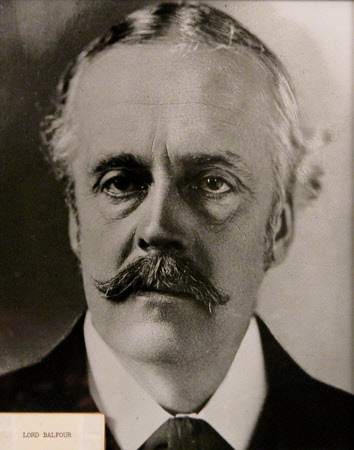Arthur James Balfour, 1st Earl of Balfour KG (1848-1930)
Category
Photographs
Date
Unknown
Materials
Photographic paper
Order this imageCollection
Chartwell, Kent
NT 1102631.3
Summary
Facsimile of a photograph of A.J. Balfour, in a black frame
Provenance
A.J. Balfour was born on 25 July 1848 in East Lothian, Scotland. Before entering politics his great interest was philosophy, and he published many books on the topics such as “Theism and Humanism”. Nevertheless in 1874 he became a Conservative MP for Hertford and within four years became private secretary to his uncle Robert Gascoigne-Cecil, Lord Sailsbury, and later Foreign Secretary for Benjamin Disraeli’s government. In 1885 he also joined Randolph Churchill’s “Fourth Party” organisation which arguably caused the collapse of Gladstone’s government by opposing the Home Rule for Ireland Bill. Balfour became Prime Minister of Great Britain in 1902 following Lord Sailsbury’s retirement and remained so until 1905 when the Conservative party lost the general election. According to historian Graham Goodlad in an article entitled “The Career of A.J. Balfour”, his time in office was one of the most unsuccessful of the twentieth century. Some of the big acts that Balfour introduced during his time as Prime Minister were the Unemployment Workmen Act of 1905 which meant that businesses and local authorities were given grants in order to employ more men so that the numbers of unemployed would decrease. He also introduced the Education Act of 1902 which got rid of school boards and instead gave responsibility to local boroughs and country councils. Despite being regarded as unsuccessful Goodlad states that “… he commanded the respect of no less than Winston Churchill, who named Balfour as one of a handful of people he wished could have shared the experience of the Second World War with him.” This respect from Churchill can be seen where he stated, “What a combination we might have been. All my fighting strength behind him [Balfour], and his judgement behind me.” Balfour remained Leader of the Conservative Party until 1911, although came back as Foreign Secretary and Lord of the Admiralty during the First World War. In 1917 he also made the controversial Balfour Declaration which consisted of an idea of creating a national homeland for the Jewish people of Palestine. Balfour died on 19 March 1930 in Woking, Surrey.
